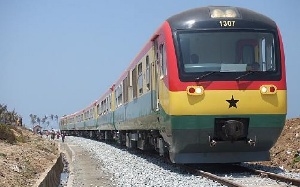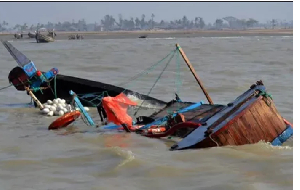By 2022, nearly 10 percent of all formal sector freight in Ghana is expected to be conveyed from one place to another by rail.
This means the country’s developing railway infrastructure can expect to be transporting some 190 million tons of goods annually, just two years from now.
Richard Dombo, chief executive of the Ghana Railway Development Authority, further forecasts that annual freight tonnage conveyed by rail will rise to 2.4 billion tons by 2030, a decade from now.
Instructively, this is more than the entire current freight volume conveyed within Ghana that is captured by formal data.
However, it is forecast that annual freight volumes would have increased dramatically by that time, the growth driven in part by sheer economic expansion, but also in part by increased economic viability of trade and manufacturing enterprise, resulting from sharply lower transportation costs for cargo – raw materials, intermediate goods and capital equipment, as well as finished goods, all inclusive.
Transportation industry analysts predict that conveyance of goods within Ghana by rail could drive transportation costs down by as much as 50 percent for bulk consignments, with a major impact on distribution costs for business, and ultimately, shelf prices of goods nationwide.
It is instructive, for instance that up to half of the price of foodstuffs cultivated in the northern part of the country but consumed in Accra, derives simply from transportation costs and price mark-ups imposed by middlemen along Ghana’s notoriously inefficient agricultural produce supply chain.
Currently, about 30 percent of internal cargo transportation in Ghana is conveyed by road at comparatively high transport cost, along the eastern, western and central transportation corridors, which are now the focus of railway infrastructural development.
Last week, Finance Minister Ken Ofori-Atta provided Parliament with the latest update on progress made towards this.
The construction of the new standard gauge Western Line (Takoradi to Kumasi) has commenced. The Kojokrom to Manso section (22 km) is on-going, and includes a 360-meter rail bridge at Eshiem, which is almost completed. The track formation is almost completed and track laying works are expected to commence in October 2020. A contract has also been signed for the development of the Manso to Huni Valley section of the line. The contract includes the construction of a new standard gauge line from the Takoradi Station to the Takoradi Port, as well as the conversion of the existing narrow gauge section from Takoradi to Kojokrom, all totalling 102 km of track works. The development of the Kumasi (Adum) to Obuasi section is currently being negotiated, and will be ready for sod-cutting by October 2020.
Government is undertaking a procurement process for the development of the Eastern rail line from Accra/Tema to Kumasi on a PPP basis, with Government taking a 30 percent interest in the entity that will be established to develop the line.
The Tema to Mpakadan standard gauge railway construction project has seen significant progress, with approximately 56km out of the 97km of track laying works completed. The project includes the construction of a 300 metre major viaduct (Railway Bridge) across the Volta River which has also commenced. By October 2020, one standard gauge train will be delivered for test runs.
Already a contract for the purchase of 35 trains has also been signed.
Business News of Monday, 27 July 2020
Source: goldstreetbusiness.com













